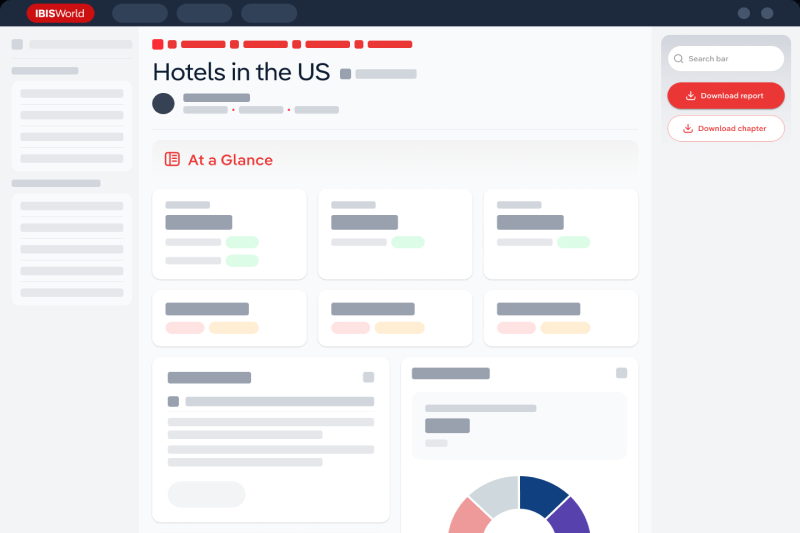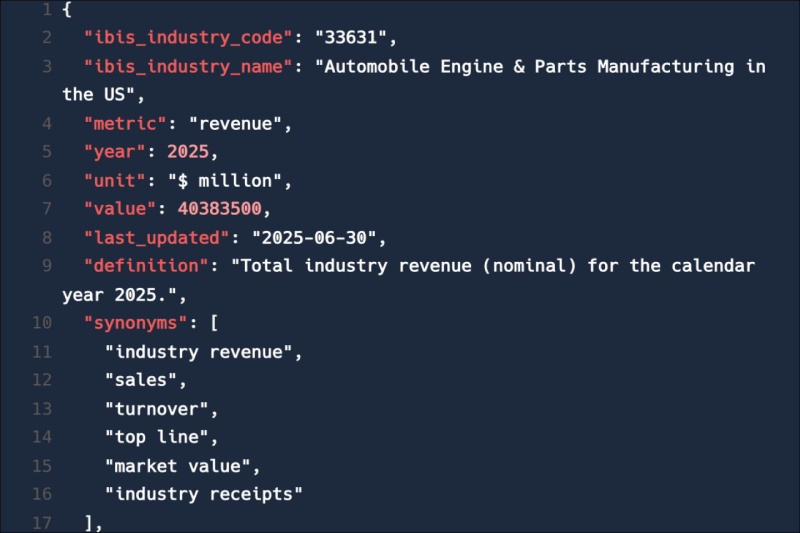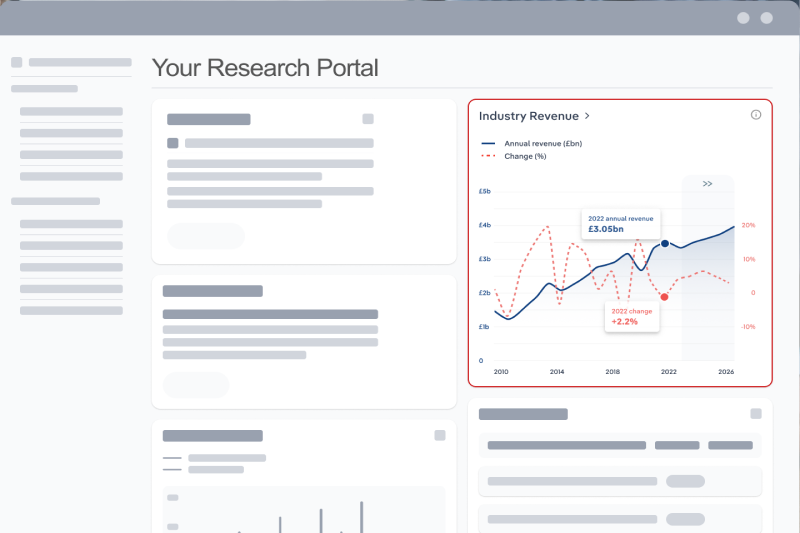IBISWorld Platform
Answer any industry question in minutes with our entire database at your fingertips.

Macroeconomic fluctuations in recent years have significantly increased volatility for custody, asset and securities services providers. While long-term spending on these services typically grows with rising stock prices and investment activity, COVID-19 initially suppressed demand because of business closures and reduced profitability. However, stimulus measures elevated personal savings during the pandemic, which fueled financial activity in 2020, temporarily boosting revenue. As the economy recovered, consumers spent more on recreational activities, causing savings rates to drop, restraining revenue growth and hindering profit in 2021. In 2022, high inflation decreased savings further, while falling stock markets led to reduced asset values. Combined, these factors led to a drop in revenue in 2022. In response, providers began offering niche services to stabilize income. Interest rate hikes in 2022 and 2023 curbed financial activity but increased savings rates and yields, pushing revenue up in 2023 and 2024. Market concentration decreased as entry into the industry surged and scandals hurt major providers’ reputations. To stay competitive, firms are embracing digital transformation, leveraging blockchain and AI to streamline services, reduce costs and boost competitiveness, especially among larger players. Overall, revenue for custody, asset and securities businesses has expanded at a CAGR of 4.2% over the past five years, reaching $45.7 billion in 2025. This includes a 7.4% jump in revenue in that year.

Answer any industry question in minutes with our entire database at your fingertips.

Feed trusted, human-driven industry intelligence straight into your platform.

Streamline your workflow with IBISWorld’s intelligence built into your toolkit.
IBISWorld's research coverage on the Custody, Asset & Securities Services industry in the United States includes market sizing, forecasting, data and analysis from 2015-2030. The most recent publication was released May 2025.
The Custody, Asset & Securities Services industry in the United States operates under the NAICS industry code 52399. This industry comprises custodial banks and brokerage firms that primarily provide trust, fiduciary and custody services to corporations, investment funds and individuals. Companies' operations consist of back-office processes for transacting securities, including settlement, accounting and record keeping. Other services include middle-office support such as securities lending, compliance pricing and performance analytics. Related terms covered in the Custody, Asset & Securities Services industry in the United States include assets under custody (auc), assets under management (aum), back-office, middle-office, custody, fund accounting, fund administration, transfer agencies, securities lending and spread.
Products and services covered in Custody, Asset & Securities Services industry in the United States include Support services for financial and commodity markets, Trust and fiduciary services and Brokerage and dealing services.
Companies covered in the Custody, Asset & Securities Services industry in the United States include The Bank Of New York Mellon Corporation, State Street Corporation and Bank Of America Corporation.
The Performance chapter covers detailed analysis, datasets, detailed current performance, sources of volatility and an outlook with forecasts for the Custody, Asset & Securities Services industry in the United States.
Questions answered in this chapter include what's driving current industry performance, what influences industry volatility, how do successful businesses overcome volatility, what's driving the industry outlook. This analysis is supported with data and statistics on industry revenues, costs, profits, businesses and employees.
The Products and Markets chapter covers detailed products and service segmentation and analysis of major markets for the for the Custody, Asset & Securities Services industry in the United States.
Questions answered in this chapter include how are the industry's products and services performing, what are innovations in industry products and services, what products or services do successful businesses offer and what's influencing demand from the industry's markets. This includes data and statistics on industry revenues by product and service segmentation and major markets.
The Geographic Breakdown chapter covers detailed analysis and datasets on regional performance of the Custody, Asset & Securities Services industry in the United States.
Questions answered in this chapter include where are industry businesses located and how do businesses use location to their advantage. This includes data and statistics on industry revenues by location.
The Competitive Forces chapter covers the concentration, barriers to entry and supplier and buyer profiles in the Custody, Asset & Securities Services industry in the United States. This includes data and statistics on industry market share concentration, barriers to entry, substitute products and buyer & supplier power.
Questions answered in this chapter include what impacts the industry's market share concentration, how do successful businesses handle concentration, what challenges do potential industry entrants face, how can potential entrants overcome barriers to entry, what are substitutes for industry services, how do successful businesses compete with substitutes and what power do buyers and suppliers have over the industry and how do successful businesses manage buyer & supplier power.
The Companies chapter covers Key Takeaways, Market Share and Companies in the Custody, Asset & Securities Services industry in the United States. This includes data and analysis on companies operating in the industry that hold a market share greater than 5%.
Questions answered in this chapter include what companies have a meaningful market share and how each company is performing.
The External Environment chapter covers Key Takeaways, External Drivers, Regulation & Policy and Assistance in the Custody, Asset & Securities Services industry in the United States. This includes data and statistics on factors impacting industry revenue such as economic indicators, regulation, policy and assistance programs.
Questions answered in this chapter include what demographic and macroeconomic factors impact the industry, what regulations impact the industry, what assistance is available to this industry.
The Financial Benchmarks chapter covers Key Takeaways, Cost Structure, Financial Ratios, Valuation Multiples and Key Ratios in the Custody, Asset & Securities Services industry in the United States. This includes financial data and statistics on industry performance including key cost inputs, profitability, key financial ratios and enterprise value multiples.
Questions answered in this chapter include what trends impact industry costs and how financial ratios have changed overtime.
The Industry Data chapter includes 10 years of historical data with 5 years of forecast data covering statistics like revenue, industry value add, establishments, enterprises, employment and wages in the Custody, Asset & Securities Services industry in the United States.
More than 6,000 businesses use IBISWorld to shape local and global economies
We were able to supplement our reports with IBISWorld’s information from both a qualitative and quantitative standpoint. All of our reporting now features some level of IBISWorld integration.

IBISWorld delivers the crisp business knowledge we need to drive our business. Whether it be serving up our major clients, winning new business or educating on industry issues, IBISWorld brings real value.

IBISWorld has revolutionised business information — which has proved commercially invaluable to exporters, investors and public policy professionals in Australia and overseas.

When you’re able to speak to clients and be knowledgeable about what they do and the state that they operate in, they’re going to trust you a lot more.

The market size of the Custody, Asset & Securities Services industry in the United States is $45.7bn in 2026.
There are 21,281 businesses in the Custody, Asset & Securities Services industry in the United States, which has grown at a CAGR of 6.1 % between 2020 and 2025.
The Custody, Asset & Securities Services industry in the United States is unlikely to be materially impacted by import tariffs with imports accounting for a low share of industry revenue.
The Custody, Asset & Securities Services industry in the United States is unlikely to be materially impacted by export tariffs with exports accounting for a low share of industry revenue.
The market size of the Custody, Asset & Securities Services industry in the United States has been growing at a CAGR of 4.2 % between 2020 and 2025.
Over the next five years, the Custody, Asset & Securities Services industry in the United States is expected to grow.
The biggest companies operating in the Custody, Asset & Securities Services industry in the United States are The Bank Of New York Mellon Corporation, State Street Corporation and Bank Of America Corporation
Providing trust and fiduciary services and Providing support services for financial and commodity markets are part of the Custody, Asset & Securities Services industry in the United States.
The company holding the most market share in the Custody, Asset & Securities Services industry in the United States is The Bank Of New York Mellon Corporation.
The level of competition is high and increasing in the Custody, Asset & Securities Services industry in the United States.




